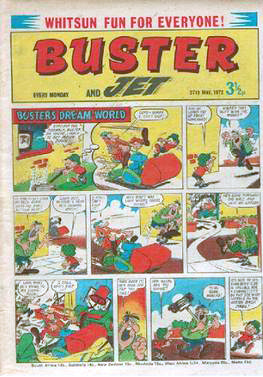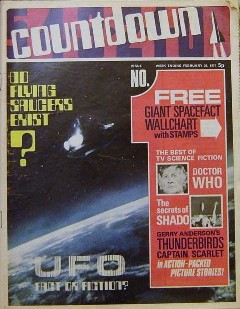The Beezer was a British comic that ran from 21 January 1956 to 21 August 1993, published by D. C. Thomson & Co. Ltd. Comic strips in The Beezer were a mix of irreverence, slapstick, and adventure; notable creators included Leo Baxendale, Gordon Bell, Paddy Brennan, David Law, Tom Paterson, Bill Ritchie, Dudley D. Watkins, Malcolm Judge, and John Geering.
A British comic is a periodical published in the United Kingdom that contains comic strips. It is generally referred to as a comic or a comic magazine, and historically as a comic paper.

Buster was a British comic which began publication in 1960, originally published by IPC Magazines Ltd under the company's comics division Fleetway, then by Egmont UK Ltd under the same imprint until its closure in 2000. Despite missing issues due to industrial action during its run, the comic published 1,902 issues in total. The comic carried a mixture of humour and adventure strips, featuring the title character Buster and a host of other characters.

Whizzer and Chips was a British comics magazine that ran from 18 October 1969 to 27 October 1990, when it merged with the comic Buster. As with most comics of the time, Whizzer and Chips was dated one week ahead of the day it actually appeared on newsstands in Great Britain. It had no relation to the earlier British comic Illustrated Chips.
Shiver and Shake was a British comic magazine published every Monday by IPC Magazines Ltd. It ran from 10 March 1973 to 5 October 1974, when it merged with Whoopee! As often happens with British comics, many names of strips were a play on popular television programmes and films of the time. The theme of the strips were mainly horror ; similar to the later Monster Fun; indeed, Frankie Stein appeared in both comics.

Knockout was a weekly British comics periodical published by Fleetway Publications from 12 June 1971 to 23 June 1973. A humour comic, the title ran until 1973 before being merged with another Fleetway title, Whizzer and Chips.

Action was a controversial weekly British children's anthology comic that was published by IPC Magazines, starting on 14 February 1976, until November 1977.
The Bumpkin Billionaires was a British humoristic comic strip which ran from 1974 until 2000. It was drawn by Mike Lacey throughout except for the last years in Whizzer and Chips by Jim Hanson.

Countdown was a British comic published weekly by Polystyle Publications – ultimately, under several different titles – from early 1971 to late summer 1973. The pages in each issue were numbered in reverse order, with page 1 at the end – a gimmick which was derived from the comic's title in order to create a countdown to the number one every week.
The Steel Claw was one of the most popular comic book heroes of British weekly adventure comics of the 1960s and 1970s. The character was revived in 2005 for Albion, a six issue mini-series published by the Wildstorm imprint of DC Comics.
Tom Paterson is a Scottish comic artist who drew characters for Fleetway in 1973–1990, and D.C Thomson from 1986 to 2012. As of 2013, he currently draws strips for Viz. He lives in Leith, with three children, and is a Hearts supporter.

Lion was a weekly British comics periodical published by Amalgamated Press from 23 February 1952 to 18 May 1974. A boys' adventure comic, Lion was originally designed to compete with Eagle, the popular weekly comic published by Hulton Press that had introduced Dan Dare. It debuted numerous memorable characters, including Captain Condor, Robot Archie, Paddy Payne and the Spider. Lion lasted for 1,156 issues before being merged with stablemate Valiant.

Valiant was a weekly British comics periodical published by Fleetway Publications and later IPC Magazines from 4 October 1962 to 16 October 1976. A boys' adventure comic, it debuted numerous memorable characters, including Captain Hurricane, The Steel Claw and Mytek the Mighty. Valiant lasted for 712 issues before being merged with stablemate Battle Picture Weekly.
The Spider is a British comic book character who began as a supervillain before becoming a superhero. He appeared in Lion between 26 June 1965 and 26 April 1969 and was reprinted in Vulcan. He was created by writer Ted Cowan and artist Reg Bunn. Superman co-creator Jerry Siegel took over the writing of the character with his third adventure, and would write the bulk of his adventures.
TV Century 21, later renamed TV21, TV21 and Tornado, TV21 and Joe 90, and TV21 again, was a weekly British children's comic published by City Magazines during the latter half of the 1960s. Originally produced in partnership with Gerry and Sylvia Anderson's Century 21 Productions, it promoted the company's many science-fiction television series. The comic was published in the style of a newspaper of the future, with the front page usually dedicated to fictional news stories set in the worlds of Fireball XL5, Stingray, Thunderbirds, Captain Scarlet and the Mysterons and other stories. The front covers were also in colour, with photographs from one or more of the Anderson series or occasionally of the stars of the back-page feature.

Smash! was a weekly British comic book, published initially by Odhams Press and subsequently by IPC Magazines, from 5 February 1966 to 3 April 1971. After 257 issues it merged into Valiant.
Boney was a British comic strip that originally appeared in the British magazine Knockout from 1971 to 1973. The strip was printed in the first issue of the magazine from June 12, 1971.

The Vigilant are a British superhero team who appear in comics published by Rebellion Developments. The team is mainly made up of updated versions of extant IPC/Fleetway Publications characters that are now owned by Rebellion, mixed with some original characters.

Thunder was a weekly British comics periodical published by Fleetway Publications from 17 October 1970 to 13 March 1971. A boys' adventure comic, the title only lasted for 22 editions before being merged with another Fleetway title, the long-established Lion.

Jet was a weekly British comics periodical published by Fleetway Publications from 1 May to 25 September 1971. A boys' adventure comic, the title only lasted for 22 editions before being merged with another Fleetway title, the long-established Buster.










